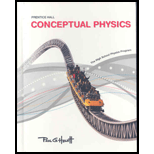
Concept explainers
To explain: The major difference between electric charges and magnetic poles.
Answer to Problem 2A
Electric charges can be separated while the magnetic poles cannot.
Explanation of Solution
Introduction:
Electric charge is the measure of amount of electrons flow from one point to another. Like charges repel each other while the unlike charges attract each other. The region at each end of a magnet where the magnetic field is the strongest are termed as magnetic poles. Like poles repel each other while the unlike poles attract each other.
Electric charges can be isolated or separated while the magnetic poles cannot be separated because they can occur together on the opposite sides of the magnet having equal strength.
Conclusion:
Electric charges can be separated while the magnetic poles cannot.
Chapter 36 Solutions
Conceptual Physics: The High School Physics Program
Additional Science Textbook Solutions
Conceptual Physics (12th Edition)
Cosmic Perspective Fundamentals
University Physics (14th Edition)
College Physics: A Strategic Approach (3rd Edition)
Essential University Physics (3rd Edition)
Essential University Physics: Volume 2 (3rd Edition)
 College PhysicsPhysicsISBN:9781305952300Author:Raymond A. Serway, Chris VuillePublisher:Cengage Learning
College PhysicsPhysicsISBN:9781305952300Author:Raymond A. Serway, Chris VuillePublisher:Cengage Learning University Physics (14th Edition)PhysicsISBN:9780133969290Author:Hugh D. Young, Roger A. FreedmanPublisher:PEARSON
University Physics (14th Edition)PhysicsISBN:9780133969290Author:Hugh D. Young, Roger A. FreedmanPublisher:PEARSON Introduction To Quantum MechanicsPhysicsISBN:9781107189638Author:Griffiths, David J., Schroeter, Darrell F.Publisher:Cambridge University Press
Introduction To Quantum MechanicsPhysicsISBN:9781107189638Author:Griffiths, David J., Schroeter, Darrell F.Publisher:Cambridge University Press Physics for Scientists and EngineersPhysicsISBN:9781337553278Author:Raymond A. Serway, John W. JewettPublisher:Cengage Learning
Physics for Scientists and EngineersPhysicsISBN:9781337553278Author:Raymond A. Serway, John W. JewettPublisher:Cengage Learning Lecture- Tutorials for Introductory AstronomyPhysicsISBN:9780321820464Author:Edward E. Prather, Tim P. Slater, Jeff P. Adams, Gina BrissendenPublisher:Addison-Wesley
Lecture- Tutorials for Introductory AstronomyPhysicsISBN:9780321820464Author:Edward E. Prather, Tim P. Slater, Jeff P. Adams, Gina BrissendenPublisher:Addison-Wesley College Physics: A Strategic Approach (4th Editio...PhysicsISBN:9780134609034Author:Randall D. Knight (Professor Emeritus), Brian Jones, Stuart FieldPublisher:PEARSON
College Physics: A Strategic Approach (4th Editio...PhysicsISBN:9780134609034Author:Randall D. Knight (Professor Emeritus), Brian Jones, Stuart FieldPublisher:PEARSON





